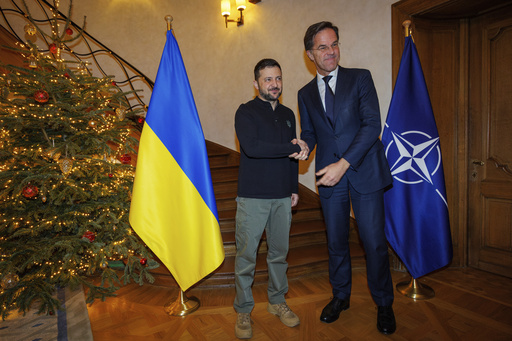
BRUSSELS — Growing concerned that U.S. security interests might be shifting away from Europe, several nations on the continent are quietly devising a plan to deploy troops to Ukraine to help maintain any potential peace agreement with Russia.
Leading this initiative are Britain and France, although specific details remain limited as participating countries aim to keep their strategies close to their chest, avoiding giving Russian President Vladimir Putin any advantage should he show willingness to negotiate an end to the conflict that has lasted three years.
It is evident that Ukraine’s President Volodymyr Zelenskyy is in need of solid security assurances for his nation until a lasting peace is established. Ukraine has long sought NATO membership as its strongest security assurance, but the U.S. has currently sidelined that possibility.
British Prime Minister Keir Starmer acknowledged the necessity of a security guarantee for Ukraine in the event of peace, stating, “I won’t get into the particular capabilities, but I do accept that if there is peace then there needs to be some sort of security guarantee for Ukraine and the U.K. will play its part in that.”
The exploration of what kind of military presence might be beneficial began approximately a year ago, yet urgency has surged recently due to fears that U.S. President Donald Trump may negotiate independently with Putin, potentially overlooking Ukraine.
Many variables remain uncertain, with a focal point being the potential role of the United States.
European leaders convened in December after Trump’s election, even before his inauguration, alongside Zelenskyy at the residence of NATO Secretary-General Mark Rutte in Brussels, with representatives from multiple countries including Britain, Denmark, France, Germany, Italy, the Netherlands, and Poland, as well as top officials from the European Union.
These discussions built upon a proposal put forth by French President Emmanuel Macron in early 2024, when he elicited significant reactions, notably from German and Polish leaders, due to his suggestion not to dismiss the possibility of deploying troops in Ukraine.
While Macron initially seemed to stand alone in this regard, his ideas have gained some traction. The composition and involvement of any military force would largely depend on the agreements reached in any potential peace talks.
Italy’s constitution limits its military engagement, while the Netherlands and Germany would require parliamentary approval to contribute troops. Poland exhibits caution stemming from historical tensions with Ukraine that trace back to World War II.
“There is a significant amount of preliminary work to do,” remarked Hanno Pevklur, Estonia’s defense minister, indicating the necessity for European allies to grasp the current situation along the front lines in Ukraine before creating an operational plan.
If Russia and Ukraine manage to draw down their forces to around “a couple thousand” troops on each side, it would appear more manageable for Europe to participate. However, if hostilities remain intense, this situation would become considerably more complex.
The nature of the military presence would also hinge on the specific terms of any peace agreement. Should negotiations advance successfully, fewer troops may be needed. Yet, experts indicate that European nations must assemble a powerful contingent rather than a smaller peacekeeping force akin to United Nations personnel.
“They need to present a real force that asserts strength because the Russians will certainly test it. Historical precedents show that they often ignore agreements,” stated Ben Hodges, former Commanding General of U.S. Army Europe, emphasizing essential military capabilities for any deployed force.
Retired French General Dominique Trinquand echoed the sentiment, noting that U.N. peacekeeping forces are typically better suited for more stable environments.
Additionally, there is a recognized need for comprehensive training of Ukrainian forces and investment in their defense infrastructure, according to Latvia’s Defense Minister Andris Spr?ds.
The size of the European contingent will depend on the nature of the peace negotiations. Zelenskyy has requested between 100,000 to 150,000 troops, while media speculation suggests a potential size of about 30,000 to 40,000, though these figures have not been substantiated by officials.
Furthermore, Ukraine’s government is eager for air support in addition to ground troops, highlighting the challenges European nations face in rapidly assembling such a large-scale military presence.
Macron expressed skepticism regarding the feasibility of deploying a vast military force, characterizing the concept as “far-fetched.” He emphasized the need for strategic, realistic, and well-considered plans that follow thorough negotiations.
U.S. Defense Secretary Pete Hegseth underscored the significance of “robust international oversight” concerning the front line, but European nations are cautious about the troop requirements that would entail.
Despite differences, there’s a consensus on needing some form of “American backstop.” European forces have long depended on U.S. logistical support and military capabilities.
At NATO headquarters, Hegseth outlined conditions under which the U.S. might endorse troop deployment aimed at providing Ukraine with strong security assurances. He remarked that any troop deployment should not be under NATO’s umbrella, acknowledging that Putin may not approve a NATO-led operation.
Hegseth noted that participating European allies would forfeit NATO’s collective defense guarantee in the event of an attack. He directly stated that no U.S. troops would be deployed to Ukraine.
From Ukraine’s point of view, any European-led operation might lack viability. “Any security guarantees are impossible without the Americans,” warned Ukrainian Foreign Minister Andrii Sybiha.
